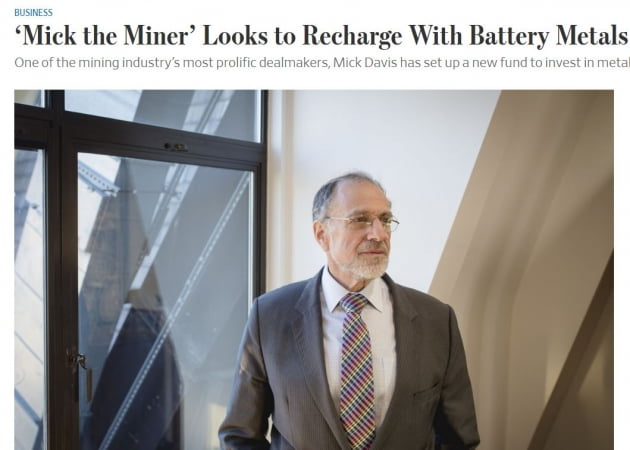
‘World mining giant’ Mick Davies has started betting on minerals for batteries in earnest. It is because the demand for related metals will rise permanently due to the expansion of electric vehicle supply and the generation of new and renewable energy.
The Wall Street Journal (WSJ) reported on the 21st (local time) that Mick Davis, called “Mick the Miner”, created a fund called “Vision Blue Resources” and has raised 60 million dollars so far. As a first investment, he invested $29.5 million in graphite mining developer Nextsource Materials.
Davis plans to raise the fund to hundreds of millions of dollars and invest primarily in battery mineral mining companies. Lithium, cobalt, graphite, and nickel are mentioned as battery-related metals. “Davis is betting that the world’s efforts to switch to low-carbon energy will require more batteries, and the metal demand will be permanent.”
In a recent report, Bernstein Research analyzed that the amount of minerals for batteries in one electric vehicle ranges from 50 to 200 kg, and the price is in the range of 500 to 2,000 dollars. Bernstein predicts that existing automakers will have to invest more money in electric vehicles within the next five years than making conventional internal combustion vehicles.
Davis said in an interview with WSJ that the demand for battery metals for electric vehicles and renewable energy storage will continue. When he withdrew from the Paris Climate Agreement, he saw the criticism of world leaders and realized the power of the move toward green energy. “Trump’s withdrawal taught us that there is a global consensus on climate change and that it is the direction we must go.” .
When Davis served as Chief Financial Officer (CFO) of British mining company Billington in 2001, he led the merger with Australian mining company BHP, helping BHP become the world’s largest mining company. Later, he moved to CEO of the Swiss mining company Extrata, betting that demand for minerals such as coal, copper, and zinc will surge due to the rise of China in 2002. With that bet, he raised a small Swiss-based minerals company into a giant with a market cap of more than $50 billion, and in 2013 signed a merger with British mining company Glencore. After that, he devoted himself to British politics and worked in the Conservative Party until 2019.
Wall Street finance companies point out that Davis will have to raise even more money to make a meaningful impact on battery-related metals. WSJ reported, “Wall Street sees that the value of listed mineral companies is already high and rising, and investment needs a long-term view.”
“Companies that mine carbon-emitting mineral assets will have a hard time getting investment in the future,” Davis explained. “Investing in battery metals is a way to catch the demand for raw materials.”
Reporter Kim Hyun-seok [email protected]
Ⓒ Hankyung.com prohibits unauthorized reproduction and redistribution
